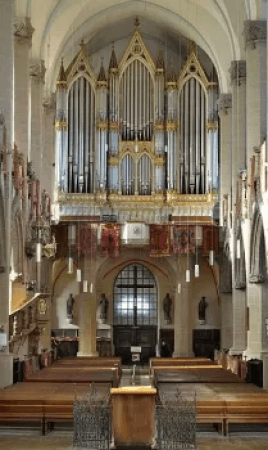Additional Libraries
Sonus Paradisi Brasov Black Church [Hauptwerk]

P2P | 14 September 2024 | 22.53 GB
Description : The instrument is the largest surviving organ of Carl August Buchholz (1796 - 1884), a prolific Berlin organ builder. It consists of four manual consoles with 63 registers. The Black Church (Biserica neagra, Schwarze Kirche) is a Lutheran church in the heart of Transylvania (today Romania). Transylvania had German colonists since the 12th century, and there has been an uninterrupted German Lutheran tradition since the beginning of Lutheranism in Europe. Brasov is the center of this church organ. The church is famous for its unique collection of historical Turkish carpets, which hang all over the walls and throughout - and they also undoubtedly contribute to the acoustics of the Gothic building. The organ is the largest mechanical instrument in Romania. The importance of the instrument is emphasized by frequent concerts: from spring to autumn, three organ concerts are held every week.
The type of instrument is sometimes called "between times". It has clear signs of a romantic sound: the dominance of 8-foot stops, the polychoric design of the divisions, fully developed choirs (flutes, strings, principals, reeds) in each division, strong dynamic contrasts between the divisions. However, it still has its roots in the design of the Baroque organ with its "Werkprinzip" and pyramidal structure (main stops, aliquots, mixtures). The core of this organ is the Joachim Wagner organ from the Marienkirche in Berlin, an organ that Buchholz renovated in 1829. The purely mechanical action drives traditional slide chests, requiring a lot of force to play on the keyboard.
The organ is physically designed on three floors: the base is occupied by the pedal with the highest pipes on the sides of the organ body. The Oberwerk is located on the floor above at the front, which results in a direct and real sound. The Unterwerk is at the back, closed and has the characteristics of a real echo compartment. The upper floor belongs to the Hauptmanual (at the front) and the Rohrwerk (at the back, closed), which allows you to hear a somewhat distant, almost mystical sound from above. The colors of the registers match each other perfectly, creating a truly smooth crescendo, where no register (even the loudest) stands out from the dark and heavy tutti.
The organ was built in 1839 in the early romantic style. It has survived without major changes to this day.
home page
The type of instrument is sometimes called "between times". It has clear signs of a romantic sound: the dominance of 8-foot stops, the polychoric design of the divisions, fully developed choirs (flutes, strings, principals, reeds) in each division, strong dynamic contrasts between the divisions. However, it still has its roots in the design of the Baroque organ with its "Werkprinzip" and pyramidal structure (main stops, aliquots, mixtures). The core of this organ is the Joachim Wagner organ from the Marienkirche in Berlin, an organ that Buchholz renovated in 1829. The purely mechanical action drives traditional slide chests, requiring a lot of force to play on the keyboard.
The organ is physically designed on three floors: the base is occupied by the pedal with the highest pipes on the sides of the organ body. The Oberwerk is located on the floor above at the front, which results in a direct and real sound. The Unterwerk is at the back, closed and has the characteristics of a real echo compartment. The upper floor belongs to the Hauptmanual (at the front) and the Rohrwerk (at the back, closed), which allows you to hear a somewhat distant, almost mystical sound from above. The colors of the registers match each other perfectly, creating a truly smooth crescendo, where no register (even the loudest) stands out from the dark and heavy tutti.
The organ was built in 1839 in the early romantic style. It has survived without major changes to this day.
home page
Only registered users can see Download Links. Please or login.


No comments yet